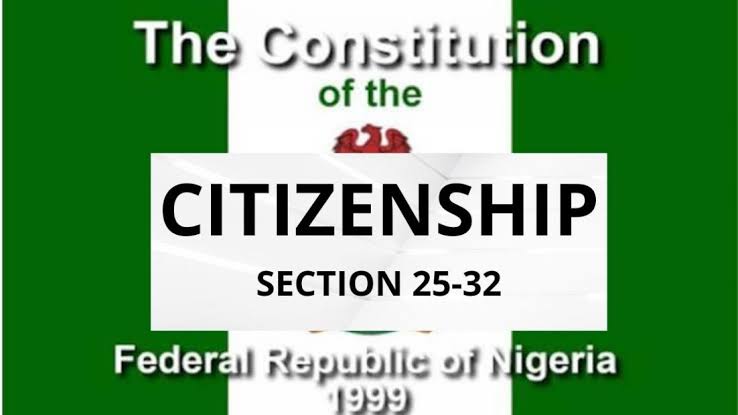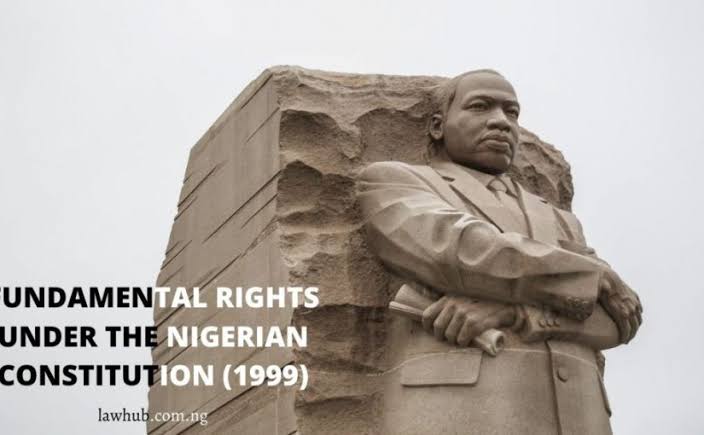Author: LawGlobal Hub
-
Schedule III to the Nigerian Constitution 1999 Below is the content for the third schedule of the Nigerian Constitution. Part I Federal Executive Bodies (Established by Section 153) A – Code of Conduct Bureau B – Council of State C – Federal Character Commission D – Federal Civil Service Commission E – Federal Judicial Service…
-

Citizenship Under the Nigerian Constitution, 1999 A citizen may simply be said as a true and legal member of a society or state. Citizens of a given state enjoy specified rights and privileges, and may be held responsible to perform certain duties, towards the peaceful coexistence and development of such state. As denotable from the…
-
Schedule II to the Nigerian Constitution 1999 Below is the content for the Second Schedule to the Nigerian Constitution. This Scheduled is titled ‘Legislative Powers‘. Part I: Exclusive Legislative List Item Part II: Concurrent Legislative List Extent of Federal and State Legislative Powers Part III: Supplemental and Interpretation Credit: constituteproject.org, Policy and Legal Advocacy Centre…
-
Schedule I of the Nigerian Constitution 1999 Below is the content of the first schedule of the Nigerian Constitution, 1999. Part II Credit: constituteproject.org, Policy and Legal Advocacy Centre (PLAC)Adapted from: here
-

Human Rights Under the 1999 Constitution The fundamental rights of the citizens of the Federal Republic of Nigeria are contained in Chapter (II) and (IV) of the Country’s constitution, 1999. The chapter II is titled, “Fundamental Objectives and directive Principles of State Policy”. The ‘rights’ contained therein are known as Social-economic rights. However, these rights…
-
Differences Between an Agreement and a Deed The above mentioned topic is very germaine especially when dealing with people that has little or no knowledge of law. It will also be important to consider when it will be necessary to use any of these instruments or documents as the case may be. AGREEMENT An agreement…
-
CLICK HERE – Criminal Code Act ↓ Arrangement – SECTION Section 1-6 [CHAPTER 1- Interpretation] Section 7-10 [CHAPTER 2 – Parties to Offences ] Section 10A-16 [CHAPTER 3 – Application of Criminal Law] Section 17-21 [ CHAPTER 4 – Punishments ] Section 22-36 [CHAPTER 5 Criminal – Responsibility ] Section 37-49D [CHAPTER 6, CHAPTER 6A – Treachery ] Section 50-60 [CHAPTER 7] Section 61-68 [CHAPTER 8, CHAPTER 9 ] Section 69-88A [CHAPTER 10 –…
-
CLICK HERE – Criminal Code Act ↓ Arrangement – SECTION Section 1-6 [CHAPTER 1- Interpretation] Section 7-10 [CHAPTER 2 – Parties to Offences ] Section 10A-16 [CHAPTER 3 – Application of Criminal Law] Section 17-21 [ CHAPTER 4 – Punishments ] Section 22-36 [CHAPTER 5 Criminal – Responsibility ] Section 37-49D [CHAPTER 6, CHAPTER 6A – Treachery ] Section 50-60 [CHAPTER 7] Section 61-68 [CHAPTER 8, CHAPTER 9 ] Section 69-88A [CHAPTER 10 –…
-
CLICK HERE – Criminal Code Act ↓ Arrangement – SECTION Section 1-6 [CHAPTER 1- Interpretation] Section 7-10 [CHAPTER 2 – Parties to Offences ] Section 10A-16 [CHAPTER 3 – Application of Criminal Law] Section 17-21 [ CHAPTER 4 – Punishments ] Section 22-36 [CHAPTER 5 Criminal – Responsibility ] Section 37-49D [CHAPTER 6, CHAPTER 6A – Treachery ] Section 50-60 [CHAPTER 7] Section 61-68 [CHAPTER 8, CHAPTER 9 ] Section 69-88A [CHAPTER 10 –…
-
N.B. This article is particular to Nigeria. Capacity to Contract Capacity to contract, simply put and given a stringent elucidation, is the competence or ability that a person has to enter into a contract. It looks beyond the purpose of the contact. Capacity to contract is the legal competence or legal ability of a person to validly…
